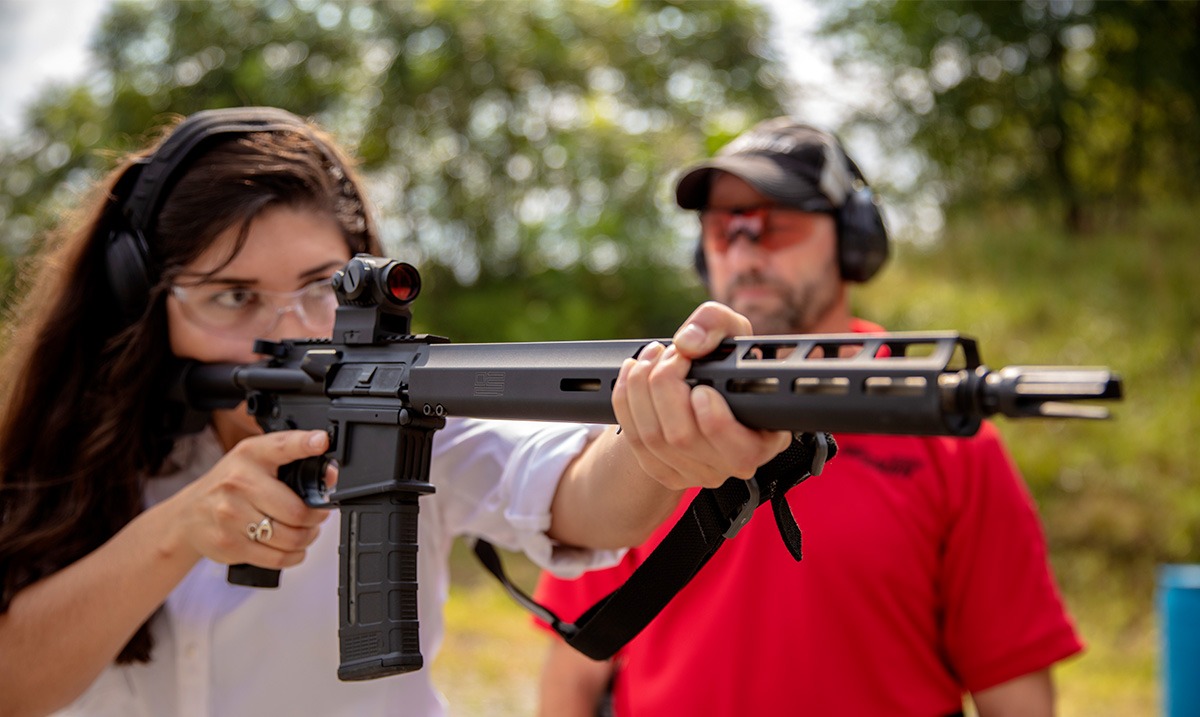 Back to News
Back to News
Image Source: AP Images/Aaron M. Sprecher
April 3, 2024
DOJ’s Dangerous ‘Red Flag’ Distribution Center
The Department of Justice (DOJ) is embarking on a dangerous journey to distribute the destruction of rights by creating a “one-stop-shop” for states to deny Due Process rights to citizens.
The DOJ created the National Extreme Risk Protection Order (ERPO) Resource Center to provide “training and technical assistance” to law enforcement, judges, lawyers, clinicians, victim service advocates, activist organizations and behavioral health professionals so they can work to implement laws that allow for firearm seizures. The one thing that this center won’t be training anyone on is how to adequately protect the Due Process rights of the accused.
That’s because in every state where these laws exist, they lack adequate Due Process provisions written into them. Instead of pushing a gun control agenda, the DOJ should be standing up for justice and demanding states include strong Due Process protections and refuse to disburse any funding or assistance until that happens. After all, standing up for civil liberties is part of their stated mission.
That’s not happening. Instead, the Biden administration is doubling down on their campaign to decimate Second Amendment rights with dubious efforts that are on shaky legal ground.
Red Flag 101
“Red flag” laws, or Extreme Risk Protection Order (ERPO) laws, are laws that allow for law enforcement and judges to intervene and seize firearms from an individual who is a danger to themselves or others. Not all of the 21 states and the District of Columbia are restricted to just law enforcement making this petition to disarm a citizen. Some states allow family members to petition for the order. Others allow medical professionals or even community organizations to intervene.
The laws in these states are very similar. They allow law enforcement and, in most cases, immediate family members and others with a very close relationship with the person to seek an ex parte court order, granted with only one side represented before a court issuing the order, authorizing law enforcement to seize a person’s firearms for a period of time, thereby infringing upon that person’s Second Amendment rights. Typically, it is weeks before there is a post-deprivation of rights hearing when the person whose Second Amendment rights have been infringed gets their day in court.
That’s the important part. Second Amendment rights are protected by the U.S. Constitution. They are no less important than First Amendment rights to freely associate with others, practice a chosen religion or speak out against the government. They’re not less important than Fourth Amendment rights, which protect against illegal search and seizure or Fifth and Fourteenth Amendment Due Process rights. When the Biden administration’s DOJ purposely ignores the glaring omission of adequate Due Process protections guaranteed by the Fifth and Fourteenth Amendments, the federal government is giving a wink-and-a-nod to states to relegate the Second Amendment to a second-class right. That means, in the eyes of the DOJ, it’s not a right at all. Rather, it’s a privilege that can be plucked away without an opportunity to go before a judge and seek redress.
Red flag laws, as currently written, are nothing short of a deprivation of rights, of fundamental civil liberties.
Due Process
There are instances when it is appropriate to deprive an individual of certain freedoms. When someone breaks the law, especially when committing a violent crime, law enforcement will take a suspect into custody, depriving that individual their freedom. That, however, will be accompanied by an arraignment, or an appearance before a judge where a defendant is advised of their Constitutional rights, afforded the right to counsel, advised of the charges against them and can enter a plea before a judge. If someone is arrested for a drunk driving incident, that individual will likely appear before a judge within 24-72 hours to hear the charge and be allowed to defend themselves against any evidence. Holding someone in jail for a week before hearing a charge is unconstitutional.
That doesn’t exist under the red flag laws already in place. Normally, to deny a fundamental civil liberty, in this case the right to keep and bear arms, there must be a pre-deprivation hearing on notice and with an opportunity to participate, unless given the exigencies of the circumstances it is not feasible to hold a pre-deprivation hearing. In that case, Due Process requires a prompt post-deprivation hearing, usually within that 24-72-hour time period. That’s not how red flag laws work, though. But it is how Due Process works.
Several of the existing state red flag laws do not provide for a pre-deprivation hearing. They also do not provide for a post-deprivation hearing until 14 days have passed. Two weeks to wait for a Due Process hearing when a person’s fundamental civil liberties – their Second Amendment right to keep and bear arms – have been infringed upon by the government is simply not consistent with the constitutional requirements of the Due Process Clause.
Ripe for Abuse
In addition to the constitutional requirement for adequate Due Process, an ERPO bill should provide that it can only be issued upon sworn testimony and showing by clear and convincing evidence that the person that is the subject of the petition (“respondent”) is an immediate and imminent threat to themselves or others. ERPO legislation should provide for the appointment of counsel paid for by the government if the respondent is unable to afford counsel.
There are more concerns. These laws are ripe for abuse. It’s not inconceivable that an abusive ex-boyfriend could seek a red flag order, knowing that his ex-girlfriend is armed. He could manipulate courts and medical professionals by attesting she’s a danger to herself and others and her firearms are seized. She’s left defenseless against a predator who knows she cannot defend herself against an attack and she’s unable to immediately refute the allegations against her. Instead, she could face weeks, or even years, of being disarmed and left vulnerable.
That’s why adequate Due Process protections in red flag law should also provide that making a false statement in support of a petition for an ERPO order is a serious criminal offense. And, the respondent should have a statutory civil cause of action against a person making a false statement. The duration of the order should also be scrutinized. These laws should provide for periodic judicial review of the order to determine whether the respondent remains an immediate and imminent risk to themselves or others. An ERPO law must also provide for the full restoration of Second Amendment rights.
Wary Congress
The DOJ’s National ERPO Center doesn’t do any of this. Instead, it creates a “one-stop-shop” for those who want to deprive Second Amendment rights a venue to do so. That’s caught the attention of Congress. U.S. Rep. Thomas Massie (R-Ky.) argues the Biden administration is misreading the Bipartisan Safer Communities Act (BSCA) to create this center. The DOJ says officials can do this because the law gives grants to implement state mental health, drug and veterans’ courts and extreme risk protection programs. Rep. Massie argues that the law didn’t authorize the Biden administration’s DOJ to create an entirely new center that assists nearly anyone interested in how to administer red flag laws.
Rep. Jim Jordan (R-Ohio), Chairman of the U.S. House of Representatives Judiciary Committee agreed. That’s why he launched an investigation into the center’s creation. He’s got questions for the Johns Hopkins Center for Gun Violence Solutions. That’s the group that the DOJ outsourced the new red flag center’s operations to operate, awarding a $ 2 million grant from the $750 million the Biden administration is funneling to the DOJ’s red flag clearing house center. That’s also the same gun control-focused center that’s funded by anti-gun billionaire Michael Bloomberg, which is part of the Johns Hopkins Bloomberg School of Public Health. Interestingly, that Bloomberg-named school has a new building about halfway between The White House and Capitol Hill.
It’s apparent what the Biden administration’s DOJ is doing. It is creating a red flag law distribution center to export these laws nationwide. They’re doing this with the thinnest of legal foundations and instead of shoring up protections for those who might be subject to these laws, they’re doubling down with gun control-funded university centers to further entrench these laws in the states.
The DOJ is ignoring its mission – to uphold the rule of law, to keep our country safe and to protect civil rights. DOJ isn’t protecting rights with this new center. It’s marketing gun control.
You may also be interested in:
Firearm Industry Efforts to Improve Background Checks Yield Meaningful Results
Categories: BP Item, Featured, Government Relations, Top Stories









